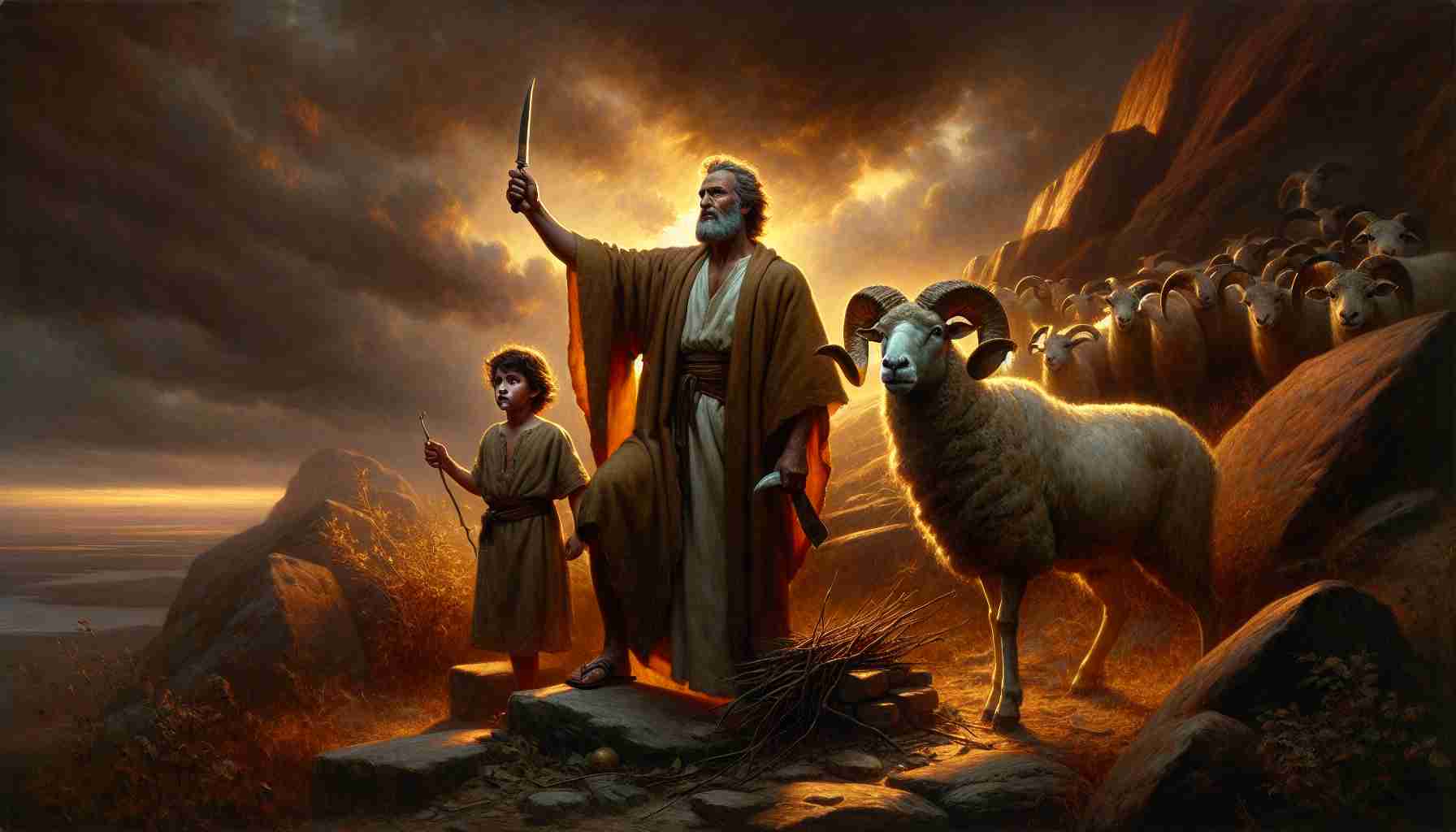

It was cold that morning. The kind of cold that creeps through your sandals and up your legs, even when the sun rises strong. I tightened my scarf and followed behind Abraham and Isaac, careful not to step too loudly. I was just a servant boy, barely old enough to carry wood, and I’d never been on a journey like this.
We’d stopped the night before near a grove of fig trees. Abraham barely spoke, and Isaac—usually all jokes and stories—said even less. Something felt wrong, like when animals grow quiet before a storm.
“My name's Eli,” I remember whispering to myself that morning, just to feel less invisible. “I help Abraham.” He’d raised me after my parents died from fever. I owed him everything. But that day, I would see something I didn’t understand—something I couldn't forget.
Halfway up the mountain, Abraham turned to me. “Stay here,” he said, placing the wood on Isaac’s back like a burden meant for someone older. “We’ll worship and then return.”
He said "we." But his eyes told a different story.
As they walked away, I stared at the knife on Abraham’s side. Polished. Sharp. Too sharp for a simple offering.
The minutes dragged. I sat on warm stone, counting birds flying overhead, fidgeting with a pebble. I thought about what it means to trust someone. Would Isaac still trust his father? Would Abraham trust G-d if this was truly what He asked?
I couldn’t hear words, but I heard movement—sharp breathing, a gasp, a shout. I bolted up the path, heart pounding. At the clearing, I ducked behind a rock just in time to see Abraham standing over Isaac—his own hands shaking, eyes raised high, knife lifted.
And then—he stopped.
He froze, like time refused to move forward, and dropped to his knees. His voice cracked. “Here I am, L-rd.”
My eyes followed his gaze. Caught by its horns in a thicket was a ram—looking right at them, as if it had been waiting.
I couldn’t move. I just watched as Abraham pulled Isaac up and wrapped his arms around him like a father holding his whole life at once. They sacrificed the ram together, fire crackling as the breeze rushed past. I smelled the smoke—thick, deep, clean.
We walked down the mountain in silence, but everything had changed.
That night by the fire, Isaac sat beside me and whispered, “He knew, Eli. G-d knew. My father wasn’t just being tested. Something greater just began.”
I never forgot that moment. Not the terror. Not the relief. Not the way Abraham looked as he held his son—like a man who had just given up everything, and somehow still received it all back.
The miracle wasn’t just that G-d spared Isaac. It was that G-d showed He could be trusted—even with what we love most.
That day, I saw a knife raised—but I also saw a promise revealed.
It was cold that morning. The kind of cold that creeps through your sandals and up your legs, even when the sun rises strong. I tightened my scarf and followed behind Abraham and Isaac, careful not to step too loudly. I was just a servant boy, barely old enough to carry wood, and I’d never been on a journey like this.
We’d stopped the night before near a grove of fig trees. Abraham barely spoke, and Isaac—usually all jokes and stories—said even less. Something felt wrong, like when animals grow quiet before a storm.
“My name's Eli,” I remember whispering to myself that morning, just to feel less invisible. “I help Abraham.” He’d raised me after my parents died from fever. I owed him everything. But that day, I would see something I didn’t understand—something I couldn't forget.
Halfway up the mountain, Abraham turned to me. “Stay here,” he said, placing the wood on Isaac’s back like a burden meant for someone older. “We’ll worship and then return.”
He said "we." But his eyes told a different story.
As they walked away, I stared at the knife on Abraham’s side. Polished. Sharp. Too sharp for a simple offering.
The minutes dragged. I sat on warm stone, counting birds flying overhead, fidgeting with a pebble. I thought about what it means to trust someone. Would Isaac still trust his father? Would Abraham trust G-d if this was truly what He asked?
I couldn’t hear words, but I heard movement—sharp breathing, a gasp, a shout. I bolted up the path, heart pounding. At the clearing, I ducked behind a rock just in time to see Abraham standing over Isaac—his own hands shaking, eyes raised high, knife lifted.
And then—he stopped.
He froze, like time refused to move forward, and dropped to his knees. His voice cracked. “Here I am, L-rd.”
My eyes followed his gaze. Caught by its horns in a thicket was a ram—looking right at them, as if it had been waiting.
I couldn’t move. I just watched as Abraham pulled Isaac up and wrapped his arms around him like a father holding his whole life at once. They sacrificed the ram together, fire crackling as the breeze rushed past. I smelled the smoke—thick, deep, clean.
We walked down the mountain in silence, but everything had changed.
That night by the fire, Isaac sat beside me and whispered, “He knew, Eli. G-d knew. My father wasn’t just being tested. Something greater just began.”
I never forgot that moment. Not the terror. Not the relief. Not the way Abraham looked as he held his son—like a man who had just given up everything, and somehow still received it all back.
The miracle wasn’t just that G-d spared Isaac. It was that G-d showed He could be trusted—even with what we love most.
That day, I saw a knife raised—but I also saw a promise revealed.